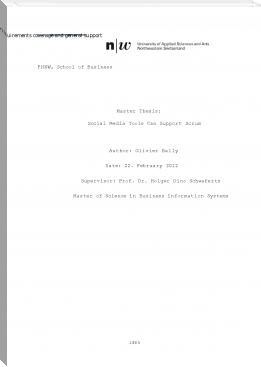Art of War once Moore - Sander R.B.E. Beals (the alpha prince and his bride full story free .TXT) 📗

- Author: Sander R.B.E. Beals
Book online «Art of War once Moore - Sander R.B.E. Beals (the alpha prince and his bride full story free .TXT) 📗». Author Sander R.B.E. Beals
“How did you do it? How did you transcend the tech-nological adolescence and avoid destroying yourself?”
Now please note, that Ellie's question only dealt with the boundary between the biological life form and its technology, although evolution usually happens between several species at once, where cross-species relationships also matter. On top of that, there are also the relationships between the individuals of a species, which more or less follow the same path. But is the relationship between members of various species any different than the relationship between those members and their tools? OK, usually we consider the tools lifeless, contrary to the humans yielding them, but as our tools evolve (note this word is commonplace in this situation) we find it more and more difficult to discern if their messages are prompted by clever programming, or by mutations of the software as it was. Heck, we even use the term 'virus' in computing for something which is apparently claimed to be hostile, but which seems remarkably ineffective in its capacity to do any real harm. Isaac Asimov tackled this concept way earlier, or at least the makers of 'I, Robot ' which was based on one of his stories did: They had dr. Alfred Lanning who got android Sonny to help him commit suicide, to deliver a speech about random fragments of code inside the computer's core to eventually become successful in altering the original programming and thus making it become something other than it originally was.
Now as a programmer, I have of course toyed with that concept. You may not know what something like Genetic Programming is all about, but I can tell you in a couple of sentences: First of all you figure out one or two solutions to the given problem, which you can then mutate is some way to alter its behavior. Essentially, you alter a few variables in each solution, when you perform the next test run. By scoring the various solutions, and using the best scoring ones to mutate them even further, you eventually come up with the perfect solution. In similar fashion, programmers used to pitch software programs against one another, so as to determine who was the strongest. Similar contests are still being held, only now the contestants are full blown robots, with their own on-board intelligence.
But back to the virus idea, because in opposition to the text above, we were talking about spontaneous mutation, rather than programmer-induced modifications. But there's something weird about viruses and spyware, you know? Because viruses seem to exist in abundance, but viruses with really harmful payloads seem to be way more scarce. On top of that, viruses tend to be caught and handled the moment they enter our systems, and spyware is apparently allowed to dwell on our computers for some time before it actually gets wiped off by the 'good' tools....
So if viruses are man-made, what is to stop anyone from writing a piece of spyware with the most dangerous payload they can find? Surely, such a thing would wipe out half the Web before anyone could say: “Hey, what is my computer doing?”. So yes, I figured it was a fake, and as an experiment I ran my computer for about half a year with no virus scanner at all. The most annoying aspect of that experiment was Windows itself, nagging me about that fact. Back then that check wasn't obvious, but in Windows 7 you can even kill that message, if you want. Keeping an eye on my task manager every now and then didn't reveal any nasty processes, and the end of the experiment (after 6 months) was the reinstall of my default virus scanner. Running its full disk scan resulted in a zero score: not one virus had found its way onto my hard disks! Now this is a “don't try this at home folks” situation: if you aren't actually convinced that you can pull it off, don't. Besides, what do we have to prove?
Basically, we have never been in competition with the computer, whether it was a singular system or a global intelligence. Much more we have been in the right half of the diagram above, coexisting and co-creating as we see fit. And this relationship is way more symbiotic than we perceive it to be. Programmers write programs in what they call source code. But that is readable to them, rather than to the computer. Other computer programs then translate it into something the computer does read and understand. But perhaps these days of human aided computer programming will soon be a thing of the past. What if we figure out how programming can be properly made self-correcting, self-designing even, and thus completely self-reliable? I know this is a hard nut to crack at this current time, but as we say in Holland: “Everything can be gotten used to, even hanging”. And essentially, there is truth in such a saying: more experience means more knowledge, means more trust in ones abilities, means more daring to step forward. That is what you learn, when people give you praise: to them it may have been an act worthy of true recognition, but to you it will always be something you did because you could do it! No heroism involved, just knowing it and following the Nike motto.
So, I figure you guys and gals have no trouble determining what I will be starting on next, right? Being a Neutral Engineering Robot for Design, I'll just go and tackle that wild idea, leaving the wild ladies to their own devices.....
Page 54 of 54
ImprintPublication Date: 05-02-2013
All Rights Reserved





Comments (0)